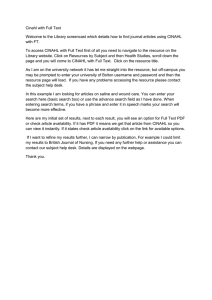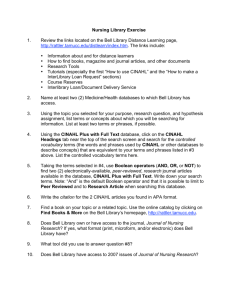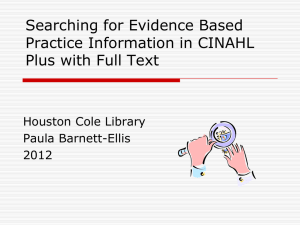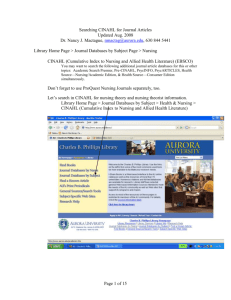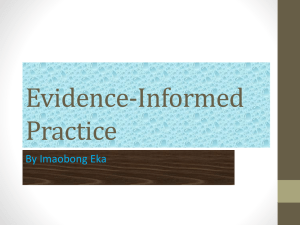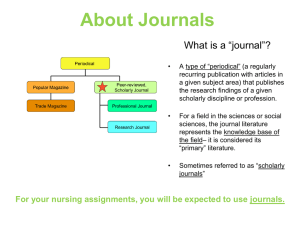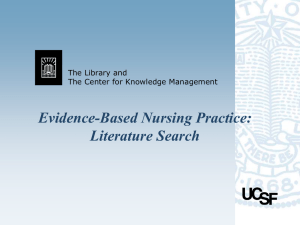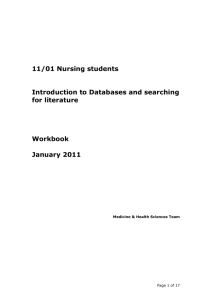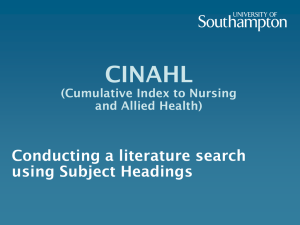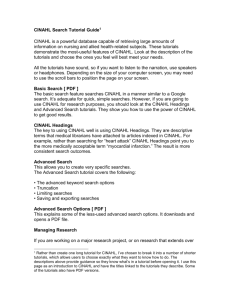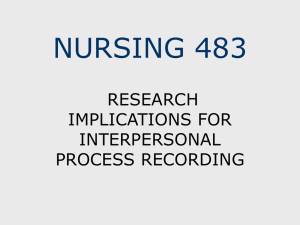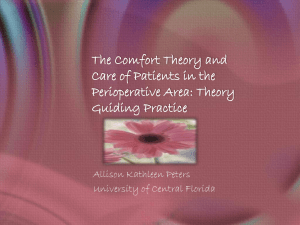CINAHL Searching for Articles PowerPoint
advertisement
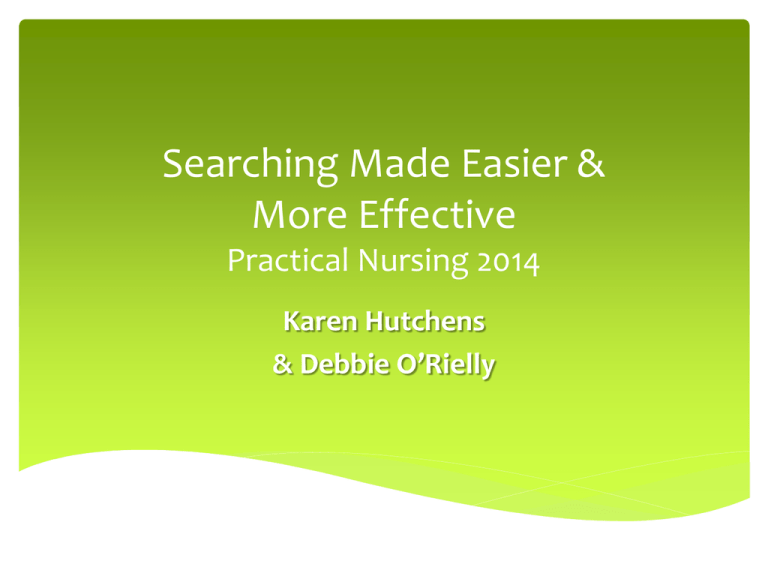
Searching Made Easier & More Effective Practical Nursing 2014 Karen Hutchens & Debbie O’Rielly Goals At the end of the session, students should be able to: Identify Search Terms Put together a search statement Know how to use CINAHL CINAHL headings, limits, print/save Evaluate search results Steps to Searching 1. 2. 3. 4. 6. 7. 8. Develop a Search Question Picking out search terms/concepts Come up with synonyms; alternate spellings Write a search statement using CINAHL headings Setting search limits Looking at & evaluating articles Save/print articles or alter search strategy (go back to step 2 or 3) Check search terms Check spelling Search too narrow or too broad Search Question Purpose of Search Question To determine what you want to know To help identify search terms or concepts Search Question Scenario: Your instructor is planning a discussion in class on how to prevent falls in the elderly living in a seniors home. She asks each student to find good current nursing articles on the subject for class. Search Questions What current information is available about fall prevention in a seniors home? Search Terms Key Term 1 Falls OR preventing falls OR safety Key Term 2 elderly OR older adults OR seniors OR aged Key Term 3 Seniors home OR Old age home OR long term care OR nursing homes Other Useful Tools ( ) brackets keep similar terms/concepts together (elderly OR aged OR seniors) “ ” parentheses used for phrases ONLY “nursing homes” “assisted suicide” “pediatric nurse” * Truncation can be substituted for any number of letters teen* = teen, teens, teenager, teenager nurs* = nurse, nursing, nurses, nurse’s Search Statement Link together main search terms and their synonyms and alternative spellings using Boolean terms AND OR Use this statement for database search Search Statement Example: “nursing home” OR “long term care” AND “accidental falls” AND prevention AND nurs* (SO Publication Name) Popular vs. Scholarly Specific, in-depth articles Original research, new developments in field Written and intended for specialists, students Peer-reviewed Standard format Tables, graphs, text Continuous pagination Broad, shorter articles Overview, social issues, public opinion Staff, freelance, popular language In-house Few references Attract, advertising, entertain Each issue page 1 CINAHL To access CINAHL, go to this site: http://www.library.mun.ca Make the following selections to get to CINAHL 1.Choose Articles tab 2. To Find articles on any topic, use article search 3. Indexes by Subjects, select nursing 4. CINAHL with full text CINAHL Headings Once in CINAHL, always go to CINAHL Headings first to check your search terms. If CINAHL heading suggest other terms to use, write them down Click on New Search, and enter your search terms Search limits Year: last 5 years English language There are articles in CINAHL in other languages. At the end of the article title you will see [language]. Even though the abstract is in English, the article will be in the language indicated in the [ ]. Search Limits Sample of a citation whose article is written in another language: Facing, accepting, growing and expecting: the practical experience of nursing students during their first clinical practice [Chinese]. (includes abstract); Sun, Jia-Jing; Sun, Hui-Lin; Journal of Nursing, 2011 Apr; 58 (2): 49-56 (journal article) ISSN: 0047-262X PMID: 21455892 CINAHL AN: 2011035176 Citation ARTICLE TITLE AUTHOR(S) JOURNAL TITLE Nursing children and adolescents with bipolar disorder: assessment, diagnosis, treatment, and management. Preview (includes abstract); McDougall T; Journal of Child & Adolescent Psychiatric Nursing, 2009 Feb; 22 (1): 33-9 (journal article) ISSN: 1073-6077 PMID: 19200290 CINAHL AN: 2010188996 YEAR MONTH VOLUME ISSUE PAGE NUMBERS Evaluate Articles Does the article answer your search question? If you answered no to this question, then you need to: Check your search terms Check your spelling Check the scope of search Too specific? Too broad? If you answered yes to the questions on the previous slide, Congrats! You’re done with the searching portion of your paper. Need Extra Help? No problem! Come see Karen Hutchens Library OR Debbie O’Reilly Computer Lab
